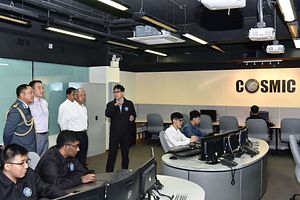This week, Brunei’s new second defense minister paid his first trip to Singapore in his current capacity. The visit put the spotlight once again on the defense relationship between the two Southeast Asian states amid wider domestic and regional challenges underway.
As I have noted before in these pages, Singapore and Brunei have a close defense relationship as part of their broader bilateral ties. This is reflected not just in traditional aspects like exchanges, visits, and exercises, but also the fact that Brunei has benefited from the expertise of the Singapore Armed Forces (SAF). Singapore’s military also holds training in Brunei as it does with a number of its other key partners as well.
The defense relationship has seen some recent gains over the past few years, with steps such as the inking of a new memorandum of understanding on defense technology cooperation back in 2016, which expanded collaboration, as well as the strengthening of existing consultative mechanisms between the two sides.
Both sides have kept up the momentum of ties through 2018 thus far amid a busy year. Singapore holds the annually rotating ASEAN chair this year, which has placed the city-state front and center on a host of regional defense issues ranging from disputes in the South China Sea to counterterrorism with lingering fears about the Islamic State. Brunei, meanwhile, has had a number of domestic changes, including a reshuffle of key officials that also affected the defense side (See: “What’s Behind Brunei’s New Defense Budget Hike?”).
This week, the defense relationship was in the headlines again with the visit of Brunei’s second defense minister, Haji Awang Halbi, to Singapore (Brunei’s head of state, Sultan Hassanal Bolkiah, holds the defense minister portfolio). Halbi’s visit, which lasted from August 13 to August 15, was his first visit to Singapore in his current capacity, which he assumed in January this year following the aforementioned reshuffle.
Halbi’s visit to Singapore included meetings with top Singapore officials such as Prime Minister Lee Hsien Loong, Defense Minister Ng Eng Hen, and Deputy Prime Minister Teo Chee Hean. Discussions included a range of bilateral as well as regional security issues, including ASEAN-related meetings and agenda items.
In addition to those meetings, Halbi’s trip also included visits to several Singapore military facilities. This included the Cybersecurity Operations, Sensing, Monitoring, and Investigation Center (COSMIC), where, according to Singapore’s defense ministry (MINDEF), Halbi was briefed on cyber defense capabilities and cybersecurity operations by MINDEF and the Singapore Armed Forces (SAF).
Separately, Halbi also paid a visit to the Unmanned Aerial Vehicle (UAV) Command at Murai Camp, which had been inaugurated back in 2007 as part of a wider reorganization of the Republic of Singapore Air Force (RSAF). As I have noted separately, the RSAF is in the midst of commemorating its Golden Jubilee this year, with a series of activities planned through 2018.

































